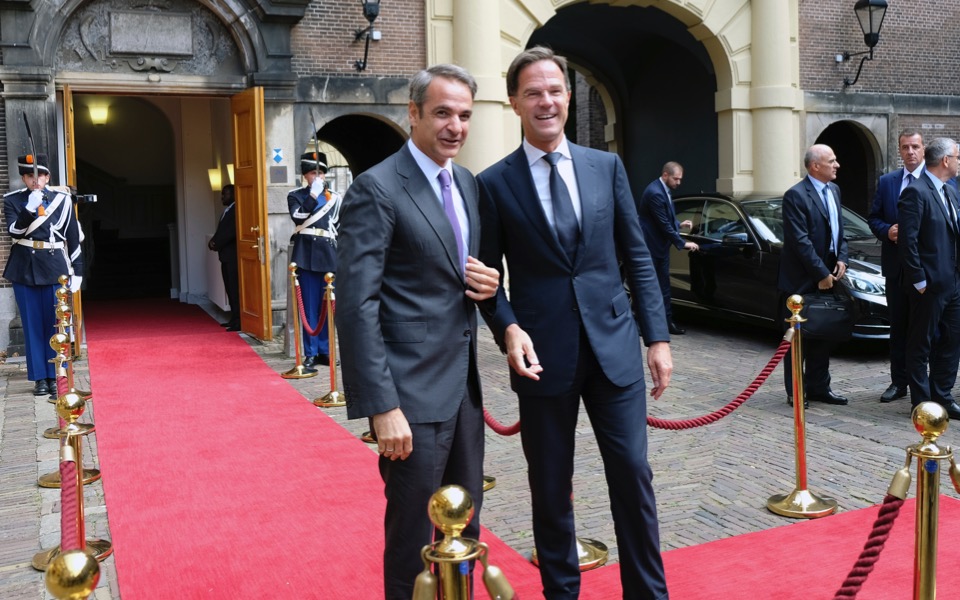Back to the future

The file that Prime Minister Kyriakos Mitsotakis took along with him on his working visit to Berlin on August 29 contained, among other things, a copy of a story from the German magazine Der Spiegel – put there by a close associate and not by this writer.
The Spiegel story was published on May 12, 1975. It was an interview with Constantine Karamanlis, which took place during a visit by the Greek prime minister to Germany. Of course Karamanlis did not travel to Berlin, but to Bonn. The Cold War was in full swing and this was his second visit as prime minister to a European country following the restoration of democracy in Greece. He had previously traveled to Paris, where he met with French President Valery Giscard d’Estaing.
Then, as now, there were a lot of serious national issues at stake. In 1975, Greece was emerging from a period of several years during which its institutions had been severely damaged. The Metapolitefsi [as the transitional period after the fall of the 1967-74 dictatorship is known] had been defined by decisive initiatives like the 1975 Greek republic referendum, essential democratization with the unhindered participation of the Left in politics and the ratification of a new Constitution which, in its basic parameters, continues to serve as the country’s institutional compass 44 years later.
At the same time, the country was endeavoring to make a great leap forward by demanding its induction into what was then the European Economic Community. Helmut Kohl, the German chancellor at the time, was skeptical. But five years later, the country got its admission ticket. It was a decisive development that put Greece on a European path that it hasn’t strayed from since. The country stayed true to course even in the summer of 2015 – political parties that had set out to confront Europe shifted their line.
Greece today is emerging from an unprecedented economic crisis. The numbers are well known, and the depth of the trauma inflicted on the country was comparatively greater even than America’s Great Depression in the 1930s. Nevertheless, Greece remained steadfastly anchored in Europe, and in the elections of 2019 the extremes were defeated and their key representatives left out of Parliament.
Just as the Metapolitefsi – together with the end of apartheid in South Africa – is held up as a paradigm of an organized and smooth institutional transition, so the multiple elections of 2019 set the conditions for a rational exit from the political destabilization of the crisis years.
Greece has a single-party government that was elected with 40 percent of the vote – a rare accomplishment in Europe today. It is also a country that appears to be stepping away from populism. What it needs to achieve now is another leap forward.
Just as it entered the EEC before Spain and Portugal, forever linking its future to that of Europe, so it is that the country needs to get further ahead today, and faster.
Climate change and its effects are being felt across every European capital and the challenge lies in the green transition of European economies – something that can bring investments and growth via an ecological, neo-Keynesian model. It is a Greece that can make faster progress in reducing its reliance on dirty energy by more effectively tapping into, firstly, its solar and, secondly, its wind resources to become Europe’s battery – this is something the Europeans are interested in, see as a possibility, understand and support.
A program to this end, such as that proposed by Kyriakos Mitsotakis in Berlin, is bound to get a positive response in every European capital, as has already happened in Paris and The Hague. Its appeal lies in the fact that it addresses current European concerns and because it involves every facet of the economy so as to constitute a convincing and robust plan that will carry Greece through to 2030 and well beyond.
It is, in this regard, similar to that visit to Bonn by Constantine Karamanlis in 1975, which was one of the key initiatives that forever unlocked Greece’s future. “Greece needs to regain its place in the international community, but it also needs to progress,” the late prime minister had told Der Spiegel at the time. His words still resonate today.
The most important thing is that, since that time, all of the political forces in this country have fallen in line – voluntarily or not – with Europe. Likewise, there is room in the plan for a green Greece by 2030 for all of the country’s economic forces – which will also find support among the Europeans.
To use a phrase often used by Kyriakos Mitsotakis when he was in the opposition, this is something Greece can accomplish. And now is the time for it to start, if for no other reason than that it owes it to the younger generations, who are, quite rightly, demanding growth on sustainable terms.
Dimitris Mitropoulos is the director of the Greek prime minister’s office for European Affairs.




